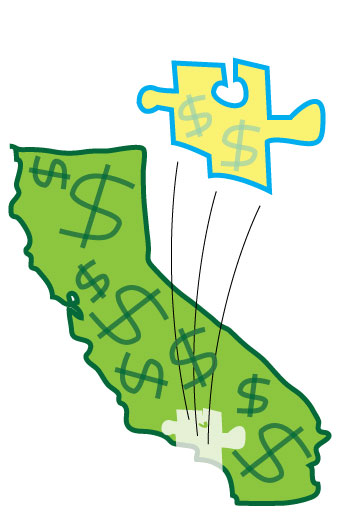
Eitan Arom
The Faculty Executive Committee approved on Friday a proposal to create a master’s degree in applied economics at UCLA, which currently only enrolls doctoral students in economics.
The development marks an important step for this campus, but has some even more striking implications for the University of California system.
The new program is currently seeking “self-supported” status, meaning it would be funded with no contributions from the state.
Though controversial, the prospect of self-sufficiency for graduate programs may lead to a more innovative and academically diverse future for the University of California. Such programs provide a way to explore how UCLA can better serve the Californian population without committing state funds to such ventures.
Of course, any time a UC school creates a program that requires no funding from Sacramento, it takes a step away from the state and its taxpayers. Given the long and distinguished history the UC has with this state, such a step should be taken with caution.
If enacted with prudence, however, this proposal would likely have academic returns to the UC that far exceed its costs in terms of apparent unity. After all, when a state’s governor makes double-digit tuition increases contingent on the fate of a ballot initiative, as Gov. Jerry Brown did with Proposition 30, it seems that when all is said and done, financial independence may be a net benefit.
Apart from any financial benefit, self-supporting programs, as UC President Mark G. Yudof wrote in an official policy statement released last year, “allow the university to serve additional students above and beyond the resources provided by the state while fulfilling demonstrated higher education and workforce needs.”
The economics department now has the opportunity to cater to a whole new group of students ““ workforce-bound pupils with no aspirations of a doctorate ““ without gambling any taxpayer money. Despite what professors in the department might tell you, that sounds an awful lot like a free lunch.
Before it can be implemented, the program must work its way through the UC bureaucracy, all the way to the UC Office of the President. Nonetheless, the vote of confidence from an elected body of UCLA professors is a significant development.
This step comes only months after a similar proposal by the UCLA Anderson School of Management was rejected in a rather scathing statement from the Coordinating Committee on Graduate Affairs in September.
Among many specific procedural concerns, the statement declared that the committee was “very troubled by the systemwide implications of the proposal.”
While the conditions of Anderson’s rejection should not be too liberally applied to the current proposal, one is nonetheless compelled to wonder what those implications are and if the same factors arise as another graduate program seeks to cut fiscal ties with the state.
Indeed, several self-supported programs have thrived at UCLA, including Anderson’s Fully Employed MBA Program.
In light of the success of this program and others, it makes sense for the economics department to move forward with an independently funded master’s degree program.
The only master’s degrees currently granted by the economics department are for doctoral students who leave before completing a dissertation ““ the beauty of the self-supported model is that UCLA can hedge the taxpayer’s bet while offering an entirely new degree.
A campus, by its nature, is supposed to be inventive and entrepreneurial. So while this program has many important hurdles left to overcome, it would be a loss to the university if it were not given at least a trial run.
Email Arom at darom@media.ucla.edu. Send general comments to opinion@media.ucla.edu or tweet us @DBOpinion.
